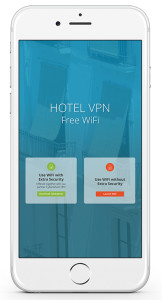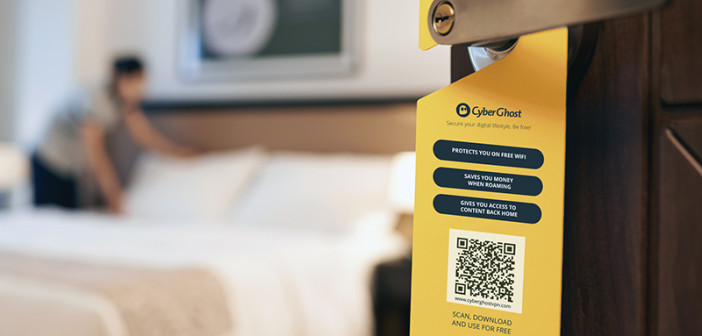BUCHAREST, ROMANIA—Guests expect and demand excellent WiFi, but they also expect secure connections. With people using mobile devices for everything from watching Stranger Things to sharing work documents to ordering a pizza delivery and paying credit card bills, there’s a lot of sensitive data that’s at risk if a hotel has an unsecure connection. It’s a problem that hoteliers have worked hard to combat and solve, and it’s a problem that CyberGhost has set its sights on.
Founded in 2011, CyberGhost secures and makes anonymous the online presence of more than 8.5 million users worldwide. And the company has recently identified travel & leisure as its next industry to focus on. “The main challenge for travelers is that WiFi is mandatory. If you go to another country, the roaming costs are much higher if you want to communicate on the internet. The data costs are really big so, naturally, travelers turn to WiFi,” said Mihai Enache, marketing director at CyberGhost VPN. “The problem with WiFi is that you can’t be certain how secure that connection will be. People can hack WiFi and receive data—theoretically encrypted data—that the user sends through the WiFi. That is a problem because if you’re using that WiFi for sensitive data like email, your accounts or payments, hackers can access that information, and they can buy different stuff with your money. The security part is really a challenge for travelers.
As such, the company is introducing its safe WiFi program for the travel and leisure industry. “We are a VPN company. Our service encrypts all of the data,” explained Enache. CyberGhost VPN establishes a 256 Bit AES encrypted connection to the CyberGhost network and takes the recognizable IP address and replaces it with a masked innocuous one. “Even if you are on unsecured WiFi, by using our app, all that data going out is encrypted so nobody will ever access your sensitive information,” he said. According to the company, benefits for the end user include security for both free and paid WiFi connections, access to content from anywhere in the world and cost reduction through mobile data compression.

Hotels that partner with CyberGhost can earn revenue when guests download the WiFi security company’s app
“We thought it was a good idea to try to help travelers. We can do that by partnering with travel-related companies—hotels, restaurants, airports, cafeterias, etc.,” said Enache. “The program we are proposing is really simple. All they have to do is implement a landing page, which is really simple and can be done on their WiFi. So whenever someone tries to access WiFi, it gives the option of continuing on that WiFi without extra protection or gives the option of downloading CyberGhost for that extra protection.” In addition, interested partners will receive custom-made materials to be promoted throughout their locations. “For each person downloading the app and installing it on their device, we would be able to pay a commission to that partner. It’s a win for travelers, a win for partners and, of course, a win for us,” said Enache. For instance, hotel partners could earn up to $0.3 for each person choosing CyberGhost WiFi protection of scanning the QR codes—though the rate is negotiable for large companies—and up to $50 for each person choosing to buy CyberGhost Premium.
Designed as a way to support new channel development, Enache noted the company would be flexible with travel partners and that this is a product that could work in any type of establishment, globally. “Any business literally anywhere just needs to register, create an account and, then, through an affiliate system, they would be able to generate materials, generate the landing page and then start earning revenue,” he said.
While the company plans to launch worldwide in January, it has already piloted the program with Lagardere Travel Retail, offering CyberGhost products in eight stores located in all major airports in Romania. “This summer, we made the pilot project in Romania. We distributed 10,000 cards in order to see how many users would activate the service and really test this project,” explained Enache. The results were pretty good; that’s why we moved forward.”
Looking to the future launch, Enache said that while the program can work anywhere, the company is interested in established markets like Western Europe, the U.S. and Canada. “At this moment, we have 250 businesses in 57 countries who expressed interest in joining the program, including a four-star hotel in California, a five-star hotel in Malaysia and several restaurants in the U.K. and Italy.” HB


